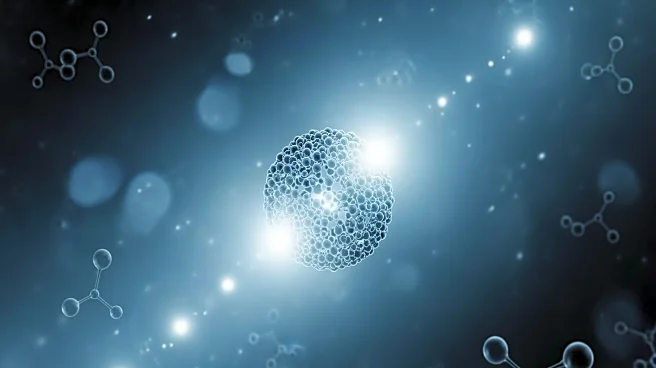What's Happening?
The Department of Chemical Sciences at the University of Padova has established a new platform for catalytic asymmetric dearomatization reactions using excited-state reactivity. This development involves the optimization of enantioselective intramolecular [2 + 2] photocycloaddition reactions, which were tested using various organocatalysts. The research identified primary amine-based organocatalysts as effective, achieving significant yields and enantiomeric excess. Mechanistic investigations revealed the involvement of triplet state reactivity in the process, supported by laser flash photolysis studies. Computational investigations further confirmed the reaction pathway, highlighting the role of triplet states in the transformation. The study expands the scope of organocatalytic enantioselective [2 + 2] cycloadditions, demonstrating the potential for further synthetic manipulations.
Why It's Important?
This advancement in catalytic asymmetric dearomatization reactions is significant for the field of chemical sciences, as it offers a new method for synthesizing complex molecules with high enantioselectivity. The ability to harness excited-state reactivity opens up possibilities for creating novel compounds that could have applications in pharmaceuticals and materials science. The research provides insights into the mechanistic aspects of photocycloadditions, which could lead to more efficient and sustainable chemical processes. The findings may benefit industries focused on drug development and chemical manufacturing, potentially leading to more cost-effective and environmentally friendly production methods.
What's Next?
The research team plans to expand the generality of their approach to include intermolecular reactions, which could further broaden the applicability of their findings. Future studies may focus on optimizing reaction conditions and exploring new substrates to enhance yield and selectivity. The team is also considering synthetic manipulations of the cycloadducts to demonstrate the versatility of the polycyclic scaffold. These efforts could lead to the development of new chemical processes and products, impacting various sectors such as pharmaceuticals and materials science.
Beyond the Headlines
The ethical implications of this research include the potential for reducing the environmental impact of chemical synthesis by utilizing more efficient and selective reactions. The study also highlights the importance of interdisciplinary collaboration in advancing scientific knowledge, as it combines experimental and computational approaches to achieve its findings. Long-term shifts in the chemical industry could result from the adoption of these new methods, promoting sustainability and innovation.









